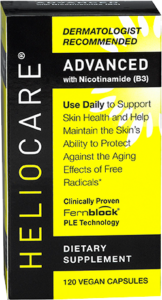Heliocare Advanced with Nicotinamide For Prevention of Skin Cancer
It is recommended that you see your dermatologist for an annual preventative skin cancer check. If you have a history of skin cancer or actinic damage (pre cancerous sun damage) you may be seen more frequently. Sun protection – such as an SPF 30 or higher is always suggested and SPF hats, shirts and bathing suit covers are a great idea for when you are participating in outdoor activities. We also suggest that you avoid outdoor activities during the peak hours of 10:00 am -3:00 pm when possible.
 In addition to these precautions, it is possible to reduce your skin cancer risk by taking an inexpensive supplement twice a day. Heliocare Advanced is an oral supplement that contains Nicotinamide and Fernblock® PLE technology. Nicotinamide has been shown in studies to reduce the rate of new squamous cell carcinomas as well as basal cell skin cancers by twenty three percent. This statistic is based on results, after one year, in patients with higher than average risk of skin cancer. The results in this study were based on patients that had a history of basal or squamous cell skin cancer, and were therefore at higher risk for new skin cancers.
In addition to these precautions, it is possible to reduce your skin cancer risk by taking an inexpensive supplement twice a day. Heliocare Advanced is an oral supplement that contains Nicotinamide and Fernblock® PLE technology. Nicotinamide has been shown in studies to reduce the rate of new squamous cell carcinomas as well as basal cell skin cancers by twenty three percent. This statistic is based on results, after one year, in patients with higher than average risk of skin cancer. The results in this study were based on patients that had a history of basal or squamous cell skin cancer, and were therefore at higher risk for new skin cancers.
Nicotinamide is a non-flushing form of vitamin B3. The recommended daily dosage is about 20mg and can be found in legumes, cereals, meat, fish, eggs, milk and yeast.
The recommended dose for skin cancer prevention is 500mg twice a day, much more than you can obtain from diet alone. Heliocare Advanced contains the recommended amount and should be taken twice daily.
The findings of the nicotinamide studies is welcome news for those that are in a higher skin cancer risk category. It is also great news for the U.S. healthcare system. In the United States, skin cancer accounts for an estimated $8.1 billion in health care spending: about $4.8 billion for nonmelanoma skin cancers and $3.3 billion for melanoma.
“This form of prevention is safe and inexpensive, costing around $10 per month, and it is widely available. It is ready to go straight to the clinic for high-risk patients with a track record of skin cancer. This is a new opportunity for skin cancer prevention,” said lead investigator Diona Damian, MBBS, PhD, Professor of Dermatology, Dermatology University of Sydney, New South Wales, Australia.
“The pill does not take the place of sunscreen use and regular skin checkups by dermatologists for people at high risk,” Dr Damian noted.
Researchers in Australia have launched a second phase of the study. The results are promising, showing that the same dose of Nicotinamide can prevent actinic keratosis in patients with sun damage.
To read the study in its entirety, follow this link.
To schedule your full body skin exam, contact our office.


